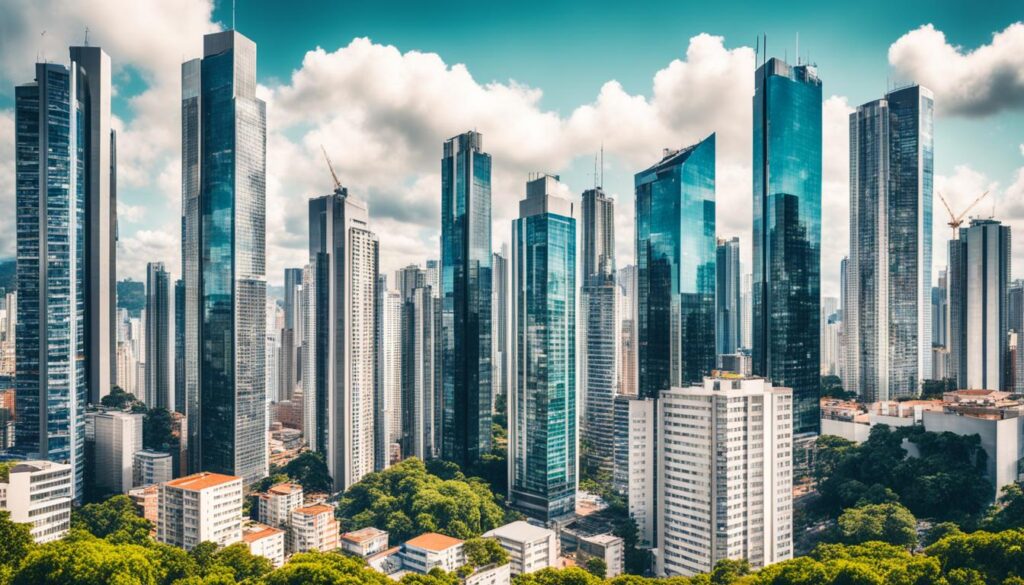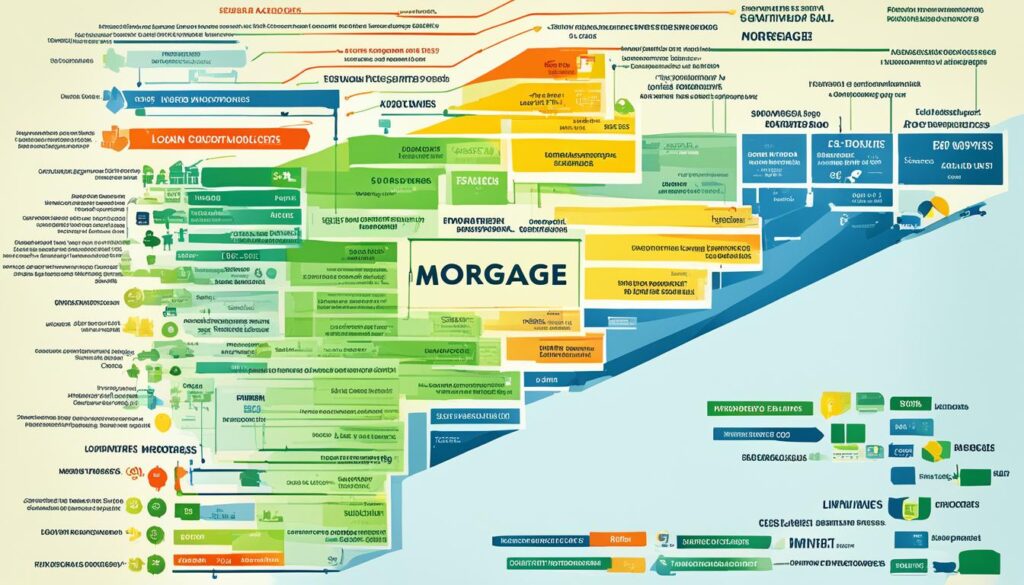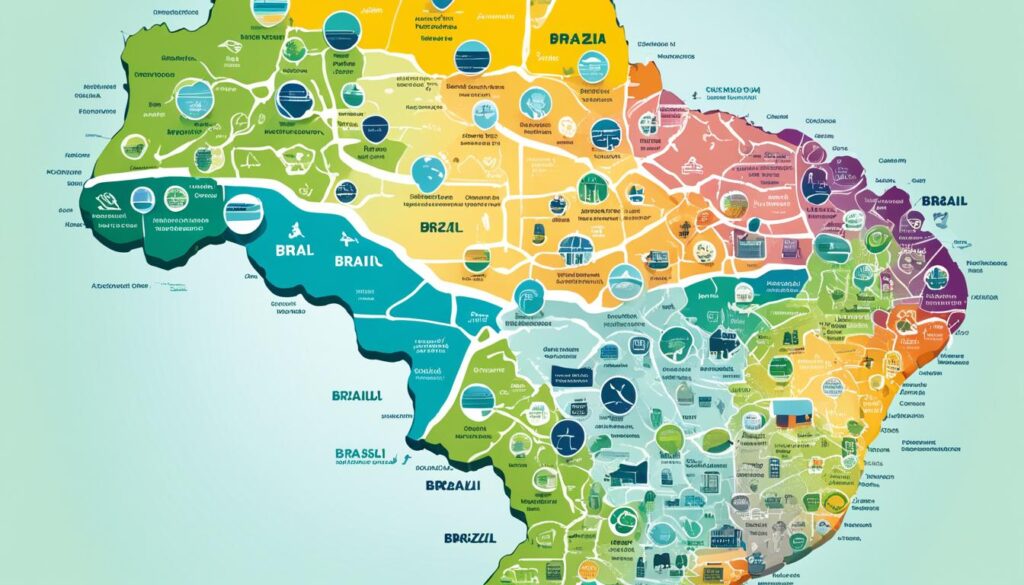With Brazil’s market offering tantalizing opportunities for real estate enthusiasts, investors worldwide are considering financing property in Brazil. Its diverse landscape of urban and beachfront locales presents a wealth of options for those looking into brazil property financing. The robust presence of nearly 17,000 bank branches implies access to brazil real estate loans is within reach for many, further supported by 22 foreign-owned banks actively boosting the sector’s dynamism1. For the contemporary investor, understanding the nuances of real estate financing Brazil is pivotal to harnessing this dynamic market’s full potential.
Digital banking has advanced in leaps and bounds, with Nubank, a major player in the realm of Brazil mortgage financing, amassing a staggering 77.7 million clients, marking its territory as a significant force in property investment Brazil1. The key to successful investment lies within grasping the intricate web of brazil property funding mechanisms, including the prolific use of traditional letters of credit for transactions, filtered through the extensive network of banking institutions1. Brazil property development finance grows ever more sophisticated against the backdrop of these evolving economic exchanges.
Key Takeaways
- Brazil offers a rich tapestry of investment opportunities for property financing.
- Understanding local banking systems and options is key to securing real estate financing.
- The presence of both local and foreign banks provides varied funding avenues.
- Digital banking platforms like Nubank bring modern solutions to Brazil property investment.
- Known payment practices guide investment and financing decisions.
- Exchange rates and regulatory oversight by the Central Bank are crucial financial considerations.
Understanding the Brazilian Real Estate Market
The Brazilian real estate market is a dynamic landscape, influenced by a spectrum of factors ranging from economic growth to fluctuating demand in property investment. For decades, the allure of Brazil’s diverse culture, lush landscapes, and economic potential has captivated foreign investment in Brazil real estate, all within a unique legal framework that governs property transactions.
Historically, Brazil’s robust economic expansion, with a GDP growth of an average of 3.3% per year between 2001-20142, laid the groundwork for a surge in the property sectors, enticing investors from around the globe. However, recent statistics indicate a notable shift, as the number of new real estate properties in Brazil fell by 30% year-on-year in Q1 of 20232. This downtrend also echoed in sales, with the number of new property units sold in Q1 2023 dipping by 9.2% compared to the previous year2.
The Appeal of Brazil for Foreign Investors
Beyond economics, Brazil sings a siren song of tropical beauty and a rhythm of life that’s hard to ignore. Its burgeoning property investment trends in Brazil are backed by the resilience shown in November 2022, when Brazil’s house price index rose by 6.34% from a year earlier2. These figures paint a picture of a market that, despite fluctuations, maintains an inherent draw for foreign investment, bolstered by a deep-rooted appreciation for the country’s vibrant potential.
Legal Framework for Property Purchase by Foreigners
Navigating the legal framework for property purchase in Brazil is critical for foreign investors. Brazil maintains specific regulations that enable foreign ownership, albeit with certain caveats to protect its national interest. The long-standing guardian of these real estate norms, Secovi-SP, the São Paulo State Housing Syndicate, has been instrumental since 1946 in representing the various sectors of the Brazilian real estate industry2.
Market Trends and Investment Opportunities
The ebb and flow of the Brazilian real estate domain are punctuated by investment opportunities that require keen insight to decipher. The present downtrend in new property availability2 implies a potential increase in value for existing properties, a tantalizing hint for the perceptive investor. Yet, as sales slow down2, the market may also present negotiating leverage for buyers, emphasizing that timing and knowledge are paramount for capitalizing on property investment trends in Brazil.
Discerning investors continue to observe Brazil’s market with interest, leveraging a rich tapestry of data to guide strategic decision-making. As this living mosaic unfolds, the insights gleaned will no doubt shape the next chapter of foreign investment in Brazil’s compelling and ever-evolving real estate saga.
Financing Property in Brazil
When it comes to securing a future in real estate, one cannot overlook the significance of property financing options in Brazil. With projections suggesting that two-thirds of humanity will reside in towns and cities by 20303, and almost 1 billion people living in slums3, it becomes imperative to explore real estate financing strategies in Brazil that are inclusive and accessible.
For investors aiming at obtaining a loan for property in Brazil, understanding the local financing landscape is essential. The Sistema Brasileiro de Poupança e Empréstimo (SBPE) plays a pivotal role in offering financing channels, yet, traditionally, only middle and upper income households have access to these mortgage providers3. This limitation has prompted the necessity for the Federal Government Support Program, which strives to extend affordable shelter to low-income families3.
The complexity of real estate financing strategies in Brazil is marked by the involvement of various key players including the Banco Central do Brasil (BCB), Caixa Econômica Federal (CEF), and the Fundo de Garantia do Tempo de Serviço (FGTS)3. These institutions contribute to the Housing Finance Systems in Brazil, offering a diversification of funding sources that impact the overall housing financing levels in the country3.
The Habitat Agenda recognizes the challenges in the existing housing finance systems, advocating for improved support for vulnerable and disadvantaged groups3.
In light of these facts, one metric of success is the number of units financed through the Sistema Financeiro da Habitação (SFH), which serves as a significant indicator of housing finance health in Brazil3. Our analysis, linked to detailed mechanisms provided in these insightful resources on housing finance in Brazil, helps investors navigate through myriad financing choices.
However, with a forecast indicating that conventional funding sources may not be sufficient to meet the housing and urban infrastructure demands over the next two decades3, alternative financing models have gained prominence. Investors are thus encouraged to consider private financing and other innovative funding methods that align with their investment goals and socio-economic considerations in Brazil.
- Conventional Banking Loans
- Private Financing Opportunities
- Socio-Economic Considerations for Investment
These financing options underline the necessity for comprehensive, inclusive, and strategic investment choices. Below is a succinct overview of the financing landscape:
| Financing Source | Access for Income Bracket | Role in Housing Finance |
|---|---|---|
| Sistema Brasileiro de Poupança e Empréstimo (SBPE) | Middle and Upper Income Households | Major Role in Funding |
| Federal Government Support | Low-Income Households | Provision of Affordable Shelter |
| Sistema Financeiro da Habitação (SFH) | Varied Income Brackets | Key Metric of Housing Finance |
By drawing parallels between the elaborate housing finance mechanisms and personal investment strategies, in conjunction with the above data, investors can carve out a prudent path for financing property in Brazil that aligns with both market potential and social responsibility.

Extrapolating these insights, it’s clear that leveraging a blend of SBPE funding, government programs, and possibly engaging with emergent private entities, represents a practical approach to financing property in an evolving Brazil. Such multipronged strategies hold the key to not only driving personal investment success but also contributing to a more sustainable and equitable urban development.3
Brazilian Mortgage Options for Foreign Investors
The economic surge Brazil experienced over the last decade has led to burgeoning opportunities within the real estate sector, specifically in the realm of mortgage options for those beyond its borders. The emergence of a robust middle class, indicated by over 18 million jobs created and 36 million people ascending the socioeconomic ladder, mirrors the potential for growth in the Brazilian mortgage market, which has been on an upward trend since 20094. With this swift expansion, the interest of foreigners in the Brazilian housing market has intensified, prompting the need to understand the various mortgage options available to them.
Types of Mortgages Available in Brazil
The types of mortgages in Brazil are as dynamic as the culture, with offerings like fixed-rate and variable-rate mortgages becoming increasingly accessible. Particularly, these financial products address the housing deficit faced by 8.2 million households, predominantly in the lower-socioeconomic sphere4. Foreign investors will find that the mortgage market, energized by government initiatives such as the Minha Casa Minha Vida program—which injected over USD$50 billion into the construction of homes—is a cornerstone in addressing this demand4.
Navigating the Brazilian Mortgage Application Process
For internationals, the brazilian mortgage application process may initially present as a labyrinth; however, it’s a navigable journey with the correct information and preparation. Despite the government’s dominant role in funding through institutions like Caixa Economica Federal, which contributes a majority to mortgage funding with a minimal two percent from foreign investment, the process remains open to global applicants4.
Comparing Local Banks and International Lending Institutions
The debate between using local banks versus international lending institutions in Brazil is influenced by several factors including, the increased propensity of foreign direct investment in the country. The rise in FDI projects, a threefold surge from USD$19 billion to USD$63 billion, underscores Brazil’s appeal as an investment hub4. This economic backdrop supports foreign investor confidence when choosing local banking sectors known for understanding the complex Brazilian real estate market over international entities that may offer less localized knowledge but potentially more diverse mortgage products.

Focusing on the luxury and vacation property market, regions such as Rio de Janeiro and the stunning northeast coast have seen house prices soar—a testament to the market’s potential, with increases of over 118.4 percent in Rio alone. This incentivizes foreign investors from Europe and Latin America, who are now significantly contributing to the rapid expansion of the mortgage market and Brazil’s overall growth in sectors beyond4.
The collaboration between local expertise and foreign interest creates a symbiotic environment fostering a range of mortgage options for international buyers, cementing Brazil’s status as an alluring and pragmatic choice for those looking to invest in a vibrant and evolving real estate market.
Navigating Legalities and Understanding Residency Options
When acquiring property in Brazil, investors face a lattice of legal requirements for property ownership which, if not meticulously adhered to, could mar the realization of their investment goals. Meanwhile, the country’s positive economic indicators—such as the noteworthy increase in Brazil’s GDP by 4.6% in 20215—have fortified its stance as a lucrative destination for property investment.

The legal journey begins with understanding the intricate details of property registration to ensure that your acquisition complies with Brazilian law. For instance, the influx of $50 billion in global FDI flows into Brazil in 20215 underscores the necessity for foreign investors to grasp the fiscal responsibilities, such as taxes and various permits, affiliated with property transactions.
Legal Requirements for Property Ownership in Brazil
To guarantee a seamless transfer of ownership, investors must contemplate property-specific legislative mandates. The fact that the U.S. held $191.6 billion in FDI stock in Brazil in 20215 reveals the scale and potential of foreign involvement in the Brazilian real estate sector, compelling investors to be well-versed with the obligations and statutory nuances of property deeds.
The Route to Residency Through Investment
Residency options for investors in Brazil are intimately tied to the investment landscape; hence, an understanding of economic trajectories is beneficial. The plunge of the unemployment rate to 7.9% at 2022’s culmination5 speaks to a recovering economy, where residency through investment is not merely a possibility but a gateway to accessing a broad array of burgeoning markets.
Considerations for Rural and Border Area Purchases
Venturing into the Brazilian rural and border areas for property investment entails a rigorous consideration of legislative constraints. While the allure of buying property in rural and border areas in Brazil persists, understanding the context—such as the debt-to-GDP ratio descending to 73.5%5—is vital for informed decision-making.
| Economic Indicator | 2021 | 2022 |
|---|---|---|
| Foreign Direct Investment (FDI) Flows | $50 billion | Data Pending |
| U.S. FDI Stock in Brazil | $191.6 billion (29.1% of all FDI) | |
| GDP Growth Rate | 4.6% | 2.9% |
| Unemployment Rate | Data Pending | 7.9% |
| Nominal Budget Deficit as % of GDP | Data Pending | 4.68% ($89.39 billion) |
| Debt-to-GDP Ratio | Data Pending | 73.5% |
Exploring Prime Locations for Real Estate Investment in Brazil
With its expansive total area of 8,515,770 sq km and a coastline stretching 7,491 km, Brazil is a treasure trove for potential real estate investments6. As we dive into the intricacies of the Brazilian market, understanding the dichotomy between beachfront and urban investments becomes crucial.

The prime locations for real estate investment in Brazil not only cater to a robust and diverse population estimated at over 220 million but also offer a rich pool of opportunities reflective of its varied ethnic groups and cultural landscape6.
Top Cities for Property Investment and Their Characteristics
Urban centers like São Paulo and Rio de Janeiro remain top cities for property investment in Brazil, leveraging their extensive urban infrastructure and global connectivity. The burgeoning economy in these metropolises offers vibrant growth potential for both residential and commercial properties, addressing the demands of an ever-evolving demographic with a median age of 35.1 years6.
Beachfront vs. Urban Investments: Pros and Cons
Brazil’s exquisite coastlines present lucrative beachfront investment options, offering a blend of holiday luxury and serene living. Cities like Fortaleza and Recife tantalize investors with their promise of idyllic settings and tourism-driven markets. Urban investments, however, propose the allure of consistent demand, bolstered by Brazil’s urban population, which dominates the age bracket of 15-64 years at 69.5%6.
Emerging Markets and Growth Potential
As the market evolves, areas like Porto Alegre and Belo Horizonte emerge as potent markets for real estate investors, supported by agricultural land use of 32.9% and permanent pastures at 23.5%, indicative of Brazil’s resource-rich territories conducive to diversified investment strategies6.
| Property Type | Pros | Cons | Growth Potential |
|---|---|---|---|
| Beachfront | High tourism appeal, potential for high rental yields | Seasonal fluctuations, potential for natural disasters | High in select in-demand areas |
| Urban | Stable demand, diverse tenant pool | Higher competition, urban sprawl | Moderate but steady |
| Emerging | Lower initial investment, high long-term returns | Requires local market knowledge, slower initial growth | Varies, with some locations poised for significant expansion |
Factoring in Brazil’s projected population growth rate of 0.61% in 2024, the real estate market shows no sign of stagnation. Instead, it heralds a future rich with opportunities across both established and emerging real estate markets in Brazil6.
Conclusion
As we wrap up our exploration of property investment in Brazil, it’s clear that the vibrant Brazilian economy and its real estate market present unique opportunities. With its status as a top economy in the Western Hemisphere, Brazil’s appeal for property investment is underpinned by robust foreign direct investment (FDI) and a promising post-pandemic recovery. The positive trend in Brazil’s GDP, which saw an increase of 4.6% in 2021 following a contraction, signals a rebound that savvy investors are monitoring closely7. Furthermore, with Brazil being a significant recipient of FDI from the United States, amounting to 24% of the total FDI, the landscape is favorable for American investors looking to expand their portfolios7.
In considering the investment climate in Brazil, investors must navigate the economic nuances. The Brazilian Central Bank’s adjustment of the benchmark Selic interest rate and the projected increase of the country’s debt-to-GDP ratio are important considerations for funding decisions7. However, the country’s encouragement of FDI in dynamic sectors, combined with competitive incentives like tax exemptions and low-cost financing, reflects a commitment to fostering a favorable environment for investors both domestically and internationally7.
In summary, the complexities of the Brazilian market demand a strategic approach to financing property in Brazil. This guide serves as a compass for investors, providing insights into market trends, the significance of FDI, and a solid understanding of the legal and residency landscape. To achieve success in this market, investors must weigh the economic indicators and leverage local advantages while balancing risk and reward. The Brazilian real estate realm is ripe with opportunity, and with the right strategies, can yield considerable returns on investment7.
FAQ
What makes Brazil an attractive destination for real estate investment?
Brazil offers stunning natural beauty, a vibrant culture, and welcoming people, making it an appealing destination for real estate investors.
What are the legal requirements for foreigners looking to purchase property in Brazil?
Foreigners must understand the legal framework for property purchase in Brazil, as it determines the rights and restrictions for foreign ownership.
What should investors consider when exploring the Brazilian real estate market?
Investors should stay informed about current market trends and investment opportunities to make informed decisions about when and where to invest in Brazil.
What are the different financing options available for property purchases in Brazil?
Investors can choose from traditional bank loans, private financing, and other creative financing methods to finance their property purchases in Brazil.
What types of mortgages are available for foreign investors in Brazil?
Foreign investors can explore options such as fixed-rate and variable-rate mortgages offered by local banks and international lending institutions.
What are the necessary steps to navigate the Brazilian mortgage application process?
Investors need to understand the documentation requirements and eligibility criteria when applying for a mortgage in Brazil.
How can investors compare local banks and international lending institutions for their mortgage financing?
Investors should consider terms, conditions, and interest rates offered by both local banks and international lending institutions to determine the most favorable financing option.
What legal requirements should foreign investors be aware of when purchasing property in Brazil?
Foreign investors should understand property registration, tax obligations, and permits to ensure a smooth and lawful transaction when buying property in Brazil.
Can foreign investors obtain Brazilian residency through property investment?
Exploring the route to residency through investment can provide insights for foreign investors interested in obtaining Brazilian residency.
What considerations should investors keep in mind when purchasing property in rural or border areas of Brazil?
Investors need to be aware of specific legal requirements and potential complications when purchasing property in rural or border areas of Brazil.
What are the top cities for real estate investment in Brazil?
This guide highlights the characteristics and growth potential of the top cities for real estate investment in Brazil.
What are the pros and cons of beachfront investments compared to urban investments in Brazil?
Investors can explore the advantages and disadvantages of beachfront and urban investments to make informed decisions.
Are there any emerging markets in Brazil with significant growth potential?
This guide identifies emerging real estate markets in Brazil that offer promising investment opportunities.
Source Links
- https://www.trade.gov/country-commercial-guides/brazil-trade-financing
- https://www.nar.realtor/doing-business-with-brazil
- https://unhabitat.org/sites/default/files/download-manager-files/Housing Finance Mechanisms in Brazil.pdf
- https://www.nar.realtor/publications/global-perspectives/booming-brazil
- https://www.state.gov/reports/2023-investment-climate-statements/brazil/
- https://www.cia.gov/the-world-factbook/countries/brazil/
- https://www.state.gov/reports/2022-investment-climate-statements/brazil/
Comments